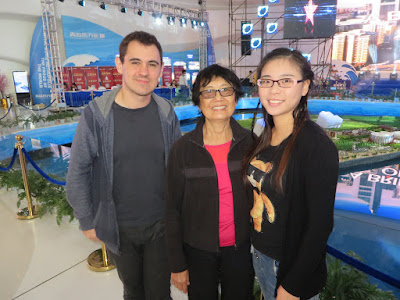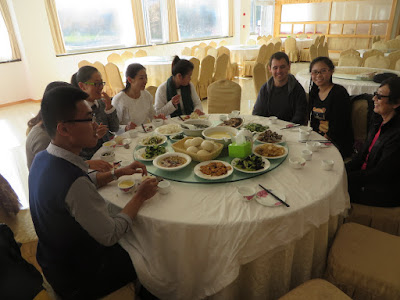This post is about an activity we did with my English Major students. Also the school schedule of a Middle School student.
Is English crazy?
The web is full of interesting stuff. Recently I found a couple of odd things
relating to English, which I discussed with my two English Major
classes.
The first was titled “Who
could have invented the English language?”
The author cleverly highlights the inconsistencies in
English, over 43-almost-rhyming lines.
Here are some extracts:
Here are some extracts:
There is no egg in eggplant or ham in hamburger; Neither apple
nor pine in pineapple
Quicksand works slowly; boxing rings are square; and a
guinea pig isn’t from Guinea or a pig
In what other language do people recite at a play and play
at a recital?
We have noses that run and feet that smell
We park in a driveway and drive on a parkway
And how can a slim chance and a fat chance be the same;
While a wise man and a wise guy are opposite?
If one fowl is a goose, and two are called geese; Why isn't the plural
of moose, meese?
If the plural of mouse is mice; The plural of house should be hice.
If the plural of mouse is mice; The plural of house should be hice.
If the plural of man is men; Shouldn’t the plural of pan be
pen?
If teachers taught, why don’t preachers praught?
If vegetarians eat vegetables, what does a humanitarian eat?
...
Yes, on the evidence, English is a crazy language!
Clever stuff. Makes me want to know more about linguistics and how English developed into the
language it is today … maybe one day …
English has had many external influences: from the Celts, to the Vikings, the Saxons, and of course the Normans. French was the language of the ruling class for several hundred years following the successful Norman invasion in 1066.
My colleague, Gautier Plassais, says that more than 25% of English words come from French.
I have often wondered about English spelling. Wonder no more: according to Gautier the reason why the English spell 'metre' with an 're' instead of 'meter' (which is much closer to the actual pronunciation) is that it comes from French. Similarly words like 'centre' and 'theatre'.
And why is a 'q' always (and often 'o') followed by 'u'? The 'u' seems quite superfluous. Again, the villain is French.
Personally, I'd like to see spelling simplified. The purists won't agree, but don't you think American spelling makes more sense? meter, center, color, behavior, neighbor, humor, favorite, etc.
At this stage I'm glad that I don't have to teach English grammar - I just focus on oral and reading English, and Western Culture. I am happy to leave English grammar with all its nuances and paradoxes (two more French words) to real experts!
English has had many external influences: from the Celts, to the Vikings, the Saxons, and of course the Normans. French was the language of the ruling class for several hundred years following the successful Norman invasion in 1066.
My colleague, Gautier Plassais, says that more than 25% of English words come from French.
I have often wondered about English spelling. Wonder no more: according to Gautier the reason why the English spell 'metre' with an 're' instead of 'meter' (which is much closer to the actual pronunciation) is that it comes from French. Similarly words like 'centre' and 'theatre'.
And why is a 'q' always (and often 'o') followed by 'u'? The 'u' seems quite superfluous. Again, the villain is French.
Personally, I'd like to see spelling simplified. The purists won't agree, but don't you think American spelling makes more sense? meter, center, color, behavior, neighbor, humor, favorite, etc.
At this stage I'm glad that I don't have to teach English grammar - I just focus on oral and reading English, and Western Culture. I am happy to leave English grammar with all its nuances and paradoxes (two more French words) to real experts!
...
The other article was titled “The amazing little word UP”
Here’s a good Trivial Pursuit question: Which two-letter
word has the most meanings?
The answer is UP. Apparently it can be an adverb, a preposition,
an adjective, a noun, and a verb.
UP sure is mixed-UP!
UP sure is mixed-UP!
We usually think of UP as “move higher” but why do we wake UP
from sleep? We lock UP the house; fix UP the car; stir Up trouble; line UP for
tickets; work UP an appetite; think Up excuses.
A drain must be opened UP because it’s blocked UP.
We open UP a shop in the morning and close it UP at night.
The sky clouds UP and then it clears UP.
My time is UP, so I’ll wrap it UP, and shut Up.
...
We had some fun discussing the oddities of English which
these students will study for the next 4 years.
At the end I challenged the students to compose a sentence (maximum 20
words) using UP as often as possible. Here are some of their contributions, produced
the following week:
Name
|
Sentence of maximum 20 words, using UP as often as
possible
Selected students from EM1502 and EM1503, December 2015
|
Leighton
|
I got up, freshened up, cleaned up the room and then met up with
my friends.
|
Sylvia
|
I woke up but it was too cold to get up so I gave up and went
back to sleep.
|
Ivana
|
I get up, eat up my breakfast, wash up, and clean up my room.
|
Sabrina
|
I woke up, got up, made up some breakfast, ate it all up, then
dressed up to go up the street.
|
Carol
|
I woke up, got up, cleaned up, and met up with my boyfriend who
I look up to.
|
Iris
|
When he showed up, she went up to him and told him that she
would always look up to him.
|
Violet
|
He came up with the idea of setting up special schools for kids
to pick up knowledge.
|
Sally
|
Keep moving up and never give up standing up for your
principles.
|
Sunny
|
I woke up, got up, tidied up, ordered up some food, and locked
up.
|
Claire
|
She told him she would make up if he cleaned up the floor and fixed
up the walls.
|
Ink
|
I told her to catch up, warm up, cheer up, and never give up.
|
Heidi
|
She got up, ordered up some food, ate it up, dressed up, then
called up her friends to meet up.
|
Not a bad effort for Freshman students, don’t you think?
...
Middle School schedule
Every Saturday morning, from 8.45 to 9.45am, Vera meets with
a young girl who wants to practice her oral English. Actually, she is the
daughter of Professor Liu Bao (Electrical Engineering Department of UPC), and
it might be more accurate to say that her parents are keen for her to take advantage
of Vera’s offer to chat with their daughter.
Her name is Liu Si Qi (English name Scarlett). She is in 3rd year of Middle School (also called Junior High School).
Next June she will sit the Zhong Kao exam which will determine her progression to Senior High School (Grades 10, 11 & 12).
 |
| Vera and Scarlett Liu Si Qi, December 2015. |
Vera asked her to describe a typical school day. This was what she outlined for Tuesdays:
Time
|
Scarlett’s Tuesdays @ school
|
7.05am
|
Arrive at school
|
7.15
|
Chinese
|
8.10
|
Chinese (cont.)
|
9.00
|
Physics
|
Break
|
All students run around the oval twice
|
10.10
|
Chemistry
|
11.10
|
Lunch
|
11.40
|
Supervised self-study
|
12.35pm
|
Rest/sleep
|
1.15
|
Govt / Politics / Marxism
|
2.10
|
English
|
Break
|
All students run around the oval 3 times
|
3.30
|
Math
|
4.25
|
Supervised homework or class
|
5.25
|
Go home; home, sweet home
|
Lessons are 45 minutes long and there is a short break between
classes, when they go to the bathroom, etc.
She said that after dinner she normally does two or three hours of homework, and goes to bed around 10pm.
Long day, isn’t it, for a 14 year-old?
School days were shorter last year, but now she is in the final year of Middle School with an important exam next June, so study is much busier.
We asked her what she does on weekends.
Saturdays: Scarlett starts the day at 8.45am, chatting with Vera. Then she goes to a private school for special tutoring in physics (10 - 12noon) and maths (1 - 3pm). In the late afternoon and evening she'll do homework and maybe watch some TV.
Sundays: mornings Scarlett will do homework and review last week's classes. Afternoons she normally meets up with school friends and they go shopping or take in a movie. She used to take Latin Dance lessons on Sundays, but stopped in August so that she can focus on her studies.
Scarlett is smart and is regularly in the top 10% of her class. But her parents think that's not good enough - they want her in the top 5%! China is a super-competitive society ... how different are the lives of our grandsons back in Australia.
School days were shorter last year, but now she is in the final year of Middle School with an important exam next June, so study is much busier.
We asked her what she does on weekends.
Saturdays: Scarlett starts the day at 8.45am, chatting with Vera. Then she goes to a private school for special tutoring in physics (10 - 12noon) and maths (1 - 3pm). In the late afternoon and evening she'll do homework and maybe watch some TV.
Sundays: mornings Scarlett will do homework and review last week's classes. Afternoons she normally meets up with school friends and they go shopping or take in a movie. She used to take Latin Dance lessons on Sundays, but stopped in August so that she can focus on her studies.
Scarlett is smart and is regularly in the top 10% of her class. But her parents think that's not good enough - they want her in the top 5%! China is a super-competitive society ... how different are the lives of our grandsons back in Australia.
No wonder Chinese students do so well academically when they
go abroad – they are often at the top of their college classes. From an early age they get used to putting in long hours, and
just work much harder than most Western students.
...
...
That's it for this post.
Remember, only 20 shopping days left till Xmas!!!
Best wishes, keep well and keep smiling.
Alex & Vera Olah
English teachers at the China University of Petroleum, Qingdao
www.upc.edu.cn
Qingdao, Thursday 3 December 2015
Last year Qingdao TV made a series on foreigners working and living in Qingdao. One of the programs featured two university teachers: Laxmisha Rai and myself. The program can be seen on on YouTube and Youku (search both "Alex Olah"). For YouTube click HERE. The program is in Chinese but with quite a bit of English,
























